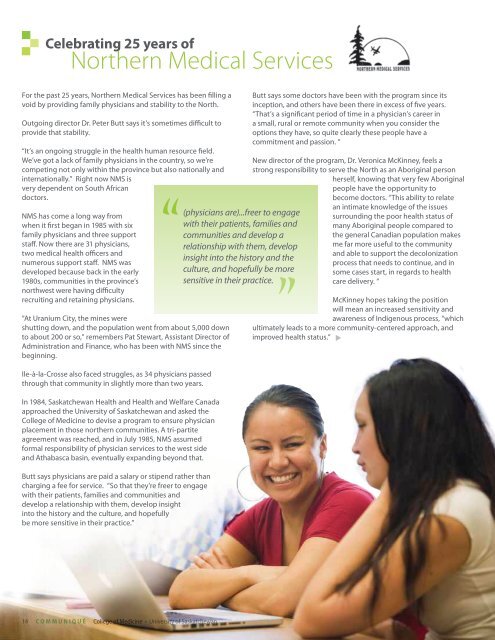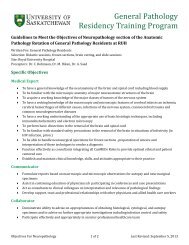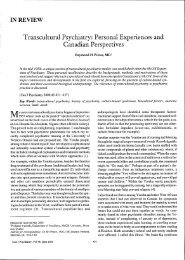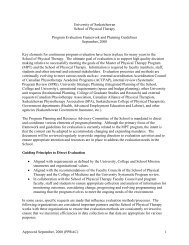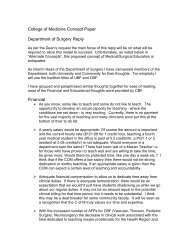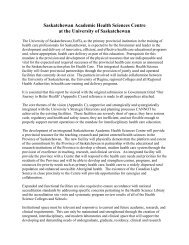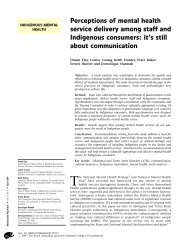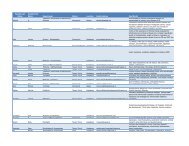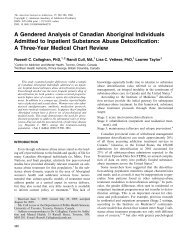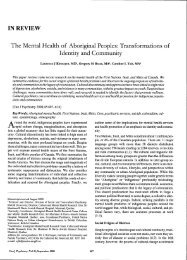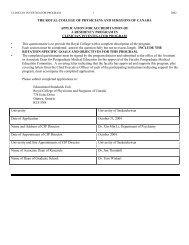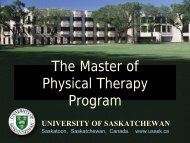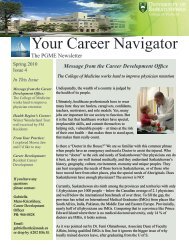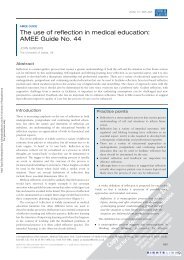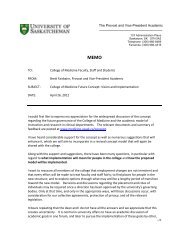COMMUNIQUé - College of Medicine - University of Saskatchewan
COMMUNIQUé - College of Medicine - University of Saskatchewan
COMMUNIQUé - College of Medicine - University of Saskatchewan
You also want an ePaper? Increase the reach of your titles
YUMPU automatically turns print PDFs into web optimized ePapers that Google loves.
Celebrating 25 years <strong>of</strong><br />
Northern Medical Services<br />
For the past 25 years, Northern Medical Services has been filling a<br />
void by providing family physicians and stability to the North.<br />
Outgoing director Dr. Peter Butt says it’s sometimes difficult to<br />
provide that stability.<br />
“It’s an ongoing struggle in the health human resource field.<br />
We’ve got a lack <strong>of</strong> family physicians in the country, so we’re<br />
competing not only within the province but also nationally and<br />
internationally.” Right now NMS is<br />
very dependent on South African<br />
doctors.<br />
NMS has come a long way from<br />
when it first began in 1985 with six<br />
family physicians and three support<br />
staff. Now there are 31 physicians,<br />
two medical health <strong>of</strong>ficers and<br />
numerous support staff. NMS was<br />
developed because back in the early<br />
1980s, communities in the province’s<br />
northwest were having difficulty<br />
recruiting and retaining physicians.<br />
“At Uranium City, the mines were<br />
shutting down, and the population went from about 5,000 down<br />
to about 200 or so,” remembers Pat Stewart, Assistant Director <strong>of</strong><br />
Administration and Finance, who has been with NMS since the<br />
beginning.<br />
Ile-à-la-Crosse also faced struggles, as 34 physicians passed<br />
through that community in slightly more than two years.<br />
In 1984, <strong>Saskatchewan</strong> Health and Health and Welfare Canada<br />
approached the <strong>University</strong> <strong>of</strong> <strong>Saskatchewan</strong> and asked the<br />
<strong>College</strong> <strong>of</strong> <strong>Medicine</strong> to devise a program to ensure physician<br />
placement in those northern communities. A tri-partite<br />
agreement was reached, and in July 1985, NMS assumed<br />
formal responsibility <strong>of</strong> physician services to the west side<br />
and Athabasca basin, eventually expanding beyond that.<br />
Butt says physicians are paid a salary or stipend rather than<br />
charging a fee for service. “So that they’re freer to engage<br />
with their patients, families and communities and<br />
develop a relationship with them, develop insight<br />
into the history and the culture, and hopefully<br />
be more sensitive in their practice.”<br />
(physicians are)...freer to engage<br />
with their patients, families and<br />
communities and develop a<br />
relationship with them, develop<br />
insight into the history and the<br />
culture, and hopefully be more<br />
sensitive in their practice.<br />
Butt says some doctors have been with the program since its<br />
inception, and others have been there in excess <strong>of</strong> five years.<br />
“That’s a significant period <strong>of</strong> time in a physician’s career in<br />
a small, rural or remote community when you consider the<br />
options they have, so quite clearly these people have a<br />
commitment and passion. “<br />
New director <strong>of</strong> the program, Dr. Veronica McKinney, feels a<br />
strong responsibility to serve the North as an Aboriginal person<br />
herself, knowing that very few Aboriginal<br />
people have the opportunity to<br />
become doctors. “This ability to relate<br />
an intimate knowledge <strong>of</strong> the issues<br />
surrounding the poor health status <strong>of</strong><br />
many Aboriginal people compared to<br />
the general Canadian population makes<br />
me far more useful to the community<br />
and able to support the decolonization<br />
process that needs to continue, and in<br />
some cases start, in regards to health<br />
care delivery. “<br />
McKinney hopes taking the position<br />
will mean an increased sensitivity and<br />
awareness <strong>of</strong> Indigenous process, “which<br />
ultimately leads to a more community-centered approach, and<br />
improved health status.”<br />
s<br />
14 C O M M U N I Q U É <strong>College</strong> <strong>of</strong> <strong>Medicine</strong> • <strong>University</strong> <strong>of</strong> <strong>Saskatchewan</strong>


